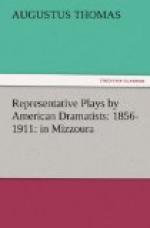In those days, Mrs. Thomas and I used to hold hands on our evening promenades; but I think it was really our foolish New York clothes that made the blacksmith smile. At any rate, we stopped at his door and talked with him. He knew Champ Clark and Dave Ball—another Missouri statesman—and had the keenest interest in the coming convention for the legislative nomination. It was fine to hear him pronounce the state name, Mizzoura, as it was originally spelt on many territorial charts, and as we were permitted to call it in the public schools until we reached the grades where imported culture ruled. The blacksmith’s helper, who was finishing a wagon shaft with a draw knife, was younger and less intelligent, and preferred to talk to Mrs. Thomas. It is distracting to listen at the same time to three persons; but I learned that “You kin make anything that’s made out o’ wood with a draw knife;” and over the bench was the frame for an upholstered chair. A driver brought in a two-horse, side seated, depot wagon on three wheels and a fence rail. The fourth wheel and its broken tire were in the wagon; and the blacksmith said he’d weld the tire at five-thirty the next morning.
We went without breakfast to see him do it. He was my heroine’s father by that time; a candidate for the legislature; and I was devising for him a second comedy daughter, to play opposite to the boy with a draw knife. That day I also found the drug-store window and the “lickerish” boxes that Cummings should break through in his attempted escape; and I recovered the niggers, the “dog fannell,” the linen dusters, and the paper collars which, in my recent prosperity, I’d forgotten. I also nominated Goodwin for the legislature, which increased his importance, and gave him something to sacrifice for the girl’s father. But it was all so poverty-stricken, as I glimpsed it through the blacksmith shop and the little house I’d chosen for its consort. I yearned for some money; not much, but enough to afford “a hired girl,” and for some means of bringing the money into the story. When we left Bowling Green, I had given Goodwin a substantial reward for the robber’s capture; but he wouldn’t accept it. That was a mere dramatist’s device; and my quiet sheriff was already above it; besides, he wasn’t sure that he’d hold the fellow. His wish to please the girl was already debating the matter with his duty.
On the way back to St. Louis, the conductor, who took our tickets, recognized me. Charlie Church had been a freight brake-man when I was in the St. Louis yards. He was proud of his advancement to a passenger conductorship—proud of his train—proud of the new Wabash road-bed on the single track line. This road-bed was made of macadam-looking metal, clean and red as the painted bricks in the local Dutch women’s gardens, and hard as flint. When we gave the right-of-way, and ran in on a siding, Church brought us up a few pieces to the back platform; and with one of them




